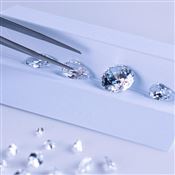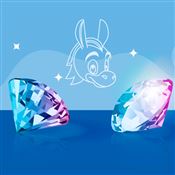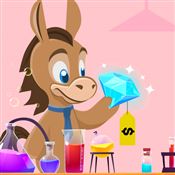Moissanite vs Diamond vs Lab Diamond
Moissanite and lab diamonds both look like diamonds for much less. Do they make good alternatives? Here's how they compare to the real thing.
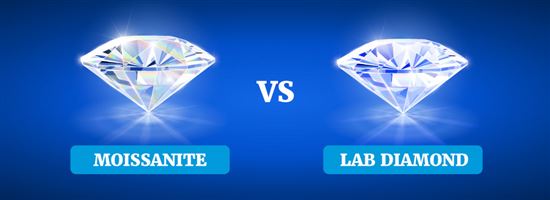 |
Love the look of diamonds, but not the price tag?
Here's some good news:
Both lab diamonds and moissanite look like diamonds, and cost just a fraction of the price. Plus, they're ethical and eco-friendly.
But what's the difference? Will they last as long as diamonds?
Read on to learn the difference between diamonds, lab diamonds, and moissanite. Find out how each stone compares in price, durability, value, and more.
Moissanite vs Diamond vs Lab Diamond Comparison
First, here's a quick overview of how diamonds, lab diamonds, and moissanite compare.
- Lab created diamonds have identical properties as natural diamonds. They are every bit the same gemstone - only that they're made in a lab, and thus much cheaper. It's a good choice if you still want a diamond, and don't care how it's made.
- Moissanite is a completely different gemstone that looks near identical to diamonds, but has different properties. It's a good choice if you just want a white sparkly stone that can pass off as a diamond. It's also the most budget-friendly option.
- Diamonds are precious gemstones formed in the earth. They're expensive because of demand and it's rare to find large, good-quality natural diamonds. They'll appeal to purists who like the special feeling of having a stone from the earth.
| Natural Mined Diamonds | Lab Created Diamonds | Moissanite |
|---|---|---|
| Formed over billions of years deep under the earth's crust | Mass produced in labs over just weeks | Mass produced in labs over just weeks |
| Made of carbon atoms | Made of carbon atoms | Made of silicon carbide |
| Range of color and clarity quality | Range of color and clarity quality | Sold in higher clarity and color grades |
| $5,000-$6,000 for a good value 1-carat diamond | $1,500-$2,000 for a good value 1-carat lab diamond | $400-$600 for a 1-carat moissanite |
| 10 on the hardness scale | 10 on the hardness scale | 9.25 on the hardness scale |
| 2.417 - 2.419 refractive index | 2.417 - 2.419 refractive index | 2.65 - 2.69 refractive index (sparklier than diamonds) |
What is Moissanite?
Moissanite is a gemstone originally discovered in a meteor crater. It literally comes from space!
As you can imagine, natural moissanite is extremely rare. Today, all moissanite are grown in labs. But they are still real gemstones with the same properties as natural moissanite.
Because of their visual similarity to diamonds, durability, and affordable pricing, moissanite has become the most popular diamond alternative.
Choose Moissanite if:
- You want to avoid buying a diamond
- You want a stone that has the look of a diamond
- You want extra sparkle
- You're on a tight budget
What is a Lab Grown Diamond?
Lab diamonds are real diamonds with the same carbon structure and chemical properties. They are identical to natural diamonds in every way.
The only difference is that they are made in a lab. The lab machines take a small diamond seed and replicate the natural growth process in just weeks.
Because they are mass produced, lab diamonds can cost 60% - 70% less than natural diamonds. They're also a good choice for those looking for an eco-friendly diamond.
Choose Lab Diamonds if:
- You are set on having a diamond
- You're not bothered by having a lab-created stone
- You want the diamond look for less
- You want a "certified" stone by GIA
- You're concerned about durability
Moissanite vs Diamond vs Lab Diamond Pricing
Lab diamonds can be as much as 70% cheaper than natural diamonds. And moissanite is even less.
A good quality 1-carat natural diamond costs around $5,500. You can get the same quality lab diamond for around $1,800. And a 1-carat moissanite costs around $500.
Let's look at some current pricing*. We're using real examples from James Allen (a popular online diamond retailer) and Charles & Colvard (the leading moissanite producer in the U.S.).
| Natural Diamond | Lab Diamond | Moissanite | |
|---|---|---|---|
| 0.7 carat | $2,300 | $820 | $319 |
| 1 carat | $5,550 | $1,620 | $399 |
| 1.5 carat | $11,380 | $2,860 | $699 |
| 2 carat | $19,070 | $5,500 | $1,099 |
| 3 carat | $38,020 | $11,560 | $1,599 |
*Pricing information from in-stock diamonds as of 8/20/21. As a benchmark, all diamonds above are round, H color, VS clarity, and Ideal cut. These are our recommended specs for best value. The moissanite prices are for near-colorless stones to match the specs of the diamonds.
If maximizing budget is your biggest priority, then it's a no-brainer to go with moissanite. You can get a good-sized stone without shelling out thousands for a ring. It's a great choice if you have other money priorities, like buying a house.
Lab diamonds are a good middle-of-the-road option. For a reasonable price, you still get a real diamond.
Moissanite vs Diamond vs Lab Diamond Comparison
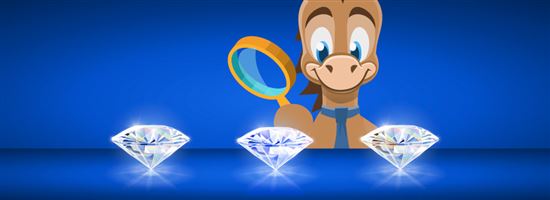 |
Not sure which gemstone is best for you? This head-to-head comparison will tell you how each stone stacks up in appearance, durability, quality, value and more.
1. Appearance
Diamonds, lab diamonds, and moissanite all look similar. All are white, sparkly gemstones. The average person won't be able to tell the difference.
Because diamonds and lab diamonds are identical, they sparkle in the exact same way. Even expert gemologists can't tell them apart without specialized tools.
Moissanite is actually more sparkly than diamonds. They have a high refractive index of 2.65–2.69 (vs 2.419 for diamonds). Compared to diamonds, moissanite has a more intense rainbow sparkle, instead of a diamond's white brilliance.
The difference between diamond and moissanite may be noticeable only if someone is comparing the two stones side-by-side. The moissanite will have extra fire due to its high refractive index.
2. Durability
Diamonds are the hardest substance on Earth, with a rating of 10 on the Mohs hardness scale. That eternalness is part of what makes them so appealing.
Moissanite comes in close at 9.25 - 9.50 on the Mohs scale. In fact, it's the 2nd hardest gemstone after diamonds.
There are very few things (if any) in your daily life that's harder than moissanite. It will not scratch and become cloudy with daily wear. Pretty much only a diamond will scratch a moissanite.
Just like diamonds, a moissanite is considered a "forever" stone. It can last a lifetime and more if you take care of it.
3. Color Quality
Both diamonds and moissanite come in colorless and near colorless grades.
Diamonds sold for jewelry are graded as colorless (D, E, F), near colorless (G, H, I, J) and faint yellow (K). There is a big price difference between color grades. We recommend H color as the best value, because the price is lower, but the diamond will still appear white.
Moissanite is sold as either "colorless" or "near colorless." Colorless moissanites will be white and clear (equivalent to D, E, F diamonds). Near colorless stones may have a slightly warmer tone (equivalent to G, H, I diamonds).
But just like with diamonds, the average untrained eye can't really tell a difference between colorless and near colorless.
4. Clarity Quality
Almost all diamonds have natural flaws. They can range from obviously visible to microscopic. Depending on the flaw, it can mar the stone or even affect brilliance.
It's important to find an eye-clean diamond, where you can't see flaws with the naked eye. The cost between clarity grades can be huge. We recommend VS2 as the sweet spot between beauty and price.
With moissanite, you don't need to worry about clarity grades. Lab technology can make higher quality stones with only microscopic flaws. All the moissanite sold is eye-clean (equivalent to VS clarity or higher).
5. Value
One downside to lab created diamonds and moissanite is that there's not much resell value. Since they're mass produced in labs, there's no historical or rareness value.
Diamonds, on the other hand, will hold some value. The resell market is pretty weak, but you can maybe get about 50% of the value back. Plus, a lot of diamond retailers have a buyback or trade-up program for natural diamonds.
A diamond ring can also be a great heirloom to pass down. Future generations may not see a lab diamond or moissanite as precious family treasures.
6. Ethical and Environmental Concerns
If social responsibility is important to you, a lab created stone will fit your values more.
Both lab diamonds and moissanites are made in safe lab environments with fair wages. There's also no destructive mining involved.
On the other hand, the diamond mining industry is still rife with problems like child labor, poor wages, and unsafe working conditions. Plus, mining has big impacts on the environment, such as deforestation and soil erosion.
If you do still want a natural diamond, Brilliant Earth only sources diamonds from ethical mines that meet labor and environmental standards.
Bottom Line
Lab diamonds and moissanite are both good alternatives to mined diamonds. Both are great if you're looking for something more budget-friendly and ethical.
Just like with diamonds, you can trust that lab diamonds and moissanite will sparkle and last forever. Your decision will come down to what you value.
- Lab diamonds are good for socially conscious shoppers who still want a diamond, and also want to save some money.
- Moissanite is good for those on tight budgets who only want a white stone that looks like a diamond.
- Natural diamonds are good for more traditional brides who want that special feeling of having a rock made from the earth.
Anna G is a research director at CreditDonkey, a diamond jeweler comparison and reviews website. Write to Anna G at feedback@creditdonkey.com. Follow us on Twitter and Facebook for our latest posts.
Note: This website is made possible through financial relationships with some of the products and services mentioned on this site. We may receive compensation if you shop through links in our content. You do not have to use our links, but you help support CreditDonkey if you do.
|
|
|

